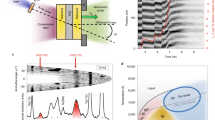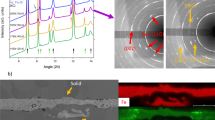Abstract
IN 1898 I published in the Proceedings of the Royal Society the results of some experiments on the evolution of gases from minerals on heating them. I succeeded in proving that the hydrogen and carbon monoxide in the gases could be accounted for quantitatively by the reduction of water vapour and carbon dioxide by ferrous oxide, or by similar substances, and that, except in cases in which cavities could be proved to exist, the evolution of a gas from a mineral implied chemical change at the moment of heating. In the cases in which helium was evolved on heating, a mineral, I pointed out that by the action of heat it is possible to obtain only half the helium, though the evolution of this gas never really ceases, but only becomes very slow. This I took to be evidence of the existence of a chemical compound of helium with some constituent of the mineral.
This is a preview of subscription content, access via your institution
Access options
Subscribe to this journal
Receive 51 print issues and online access
$199.00 per year
only $3.90 per issue
Buy this article
- Purchase on Springer Link
- Instant access to full article PDF
Prices may be subject to local taxes which are calculated during checkout
Similar content being viewed by others
Author information
Authors and Affiliations
Rights and permissions
About this article
Cite this article
TRAVERS, M. On the State in which Helium Exists in Minerals. Nature 71, 248–249 (1905). https://doi.org/10.1038/071248e0
Issue Date:
DOI: https://doi.org/10.1038/071248e0
Comments
By submitting a comment you agree to abide by our Terms and Community Guidelines. If you find something abusive or that does not comply with our terms or guidelines please flag it as inappropriate.



